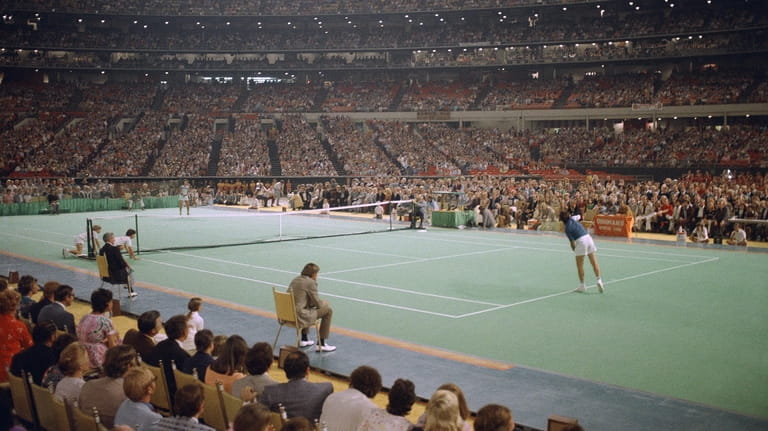Battle of the Sexes: Billie Jean King's win over Bobby Riggs 50 years ago a huge milestone for women's rights
“The Battle of the Sexes” was the first sporting event not involving a football that I can remember my family watching together.
Fifty years ago this week, we crowded in front of our television, a large piece of furniture with a small screen that got four channels. Like nearly everyone else in the nation, we turned the dial to ABC to watch self-proclaimed male chauvinist Bobby Riggs take on Wimbledon champion Billie Jean King.
King was not just playing for herself. She was playing for my mother, who in 1973 was still legally barred from having a credit card in her own name. She was playing for me, who still had limited opportunities to play sports despite the recent passage of Title IX. And, whether they knew it or not, she was playing for the men in our lives who were just starting to consider that they might want their daughters to have the same opportunities as their sons.
“No, it was never about sports. It was about change,” King told Newsday last week about the match that was watched by a record 90 million people worldwide. “It was about changing the hearts and minds of people, getting them to think differently, getting them to believe in women.”
Fast forward 50 years, corporations and fans are showing that they believe in women and women’s sports. Coco Gauff’s championship match at the U.S. Open drew 1.1 million more viewers than Novak Djokovic’s match. The WNBA has just had its most watched season in 21 years. On Monday, the Professional Women’s Hockey League held its inaugural draft and King, whose company BJK Enterprises is a big investor in the league, was on hand to announce the top pick.
When Gauff was presented with her $3 million check for winning the U.S. Open, she turned to King who had attended the match.
"Thank you Billie," Gauff said. "For fighting for this."
On Wednesday, King moved toward becoming the first female individual athlete to be awarded the Congressional Gold Medal.
Three U.S. senators introduced a bill that would award the honor to King. “She’s both a role model for women and girls everywhere, but she’s also a battle-tested warrior for women’s rights and equality,” said Sen. Kirsten Gillibrand of New York, one of the bill's leaders in the Senate along with Sens. Shelley Moore Capito of West Virginia and Kyrsten Sinema of Arizona.
Women’s sports are finally having their moment, a moment that King’s match laid the foundation for when she agreed to play Riggs in the $100,000 winner-take-all event just four months after Riggs had beaten Margaret Court in straight sets.

Billie Jean King and Bobby Riggs compete in the “Battle of the Sexes” tennis match at the Houston Astrodome in Houston, Texas on Sept. 20, 1973. Credit: AP
Played in front of 30,000 spectators at the Houston Astrodome, the Riggs-King match was conceived as a spectacle that would surely reassert male dominance if she did not beat the 55-year-old tennis legend well past his prime.
King, then 29, understood the power of theater and so she allowed herself to be carried out to the court like Cleopatra in a gold litter held aloft by four bare-chested men while Riggs was wheeled in on a rickshaw pulled by models in tight shirts that read “Bobby’s Bosom Buddies.” She understood that the best way to shut up Riggs was on the court, so she simply rolled her eyes when he declared "I'll put Billie Jean King and all the other women's libbers back where they belong — in the kitchen and the bedroom" before the match.
King knew exactly what was at stake here, and she knew she had to win and win convincingly. And so she ran the out-of-shape Riggs around the court, winning 6-4, 6-3, 6-3. “I underestimated you,” Riggs said to King, stating the obvious as they shook hands after the match.
Few have underestimated her since. King won a combined 39 Grand Slam doubles and singles titles, but her greatest legacy may be the Riggs match and how it, coupled with the passage and enforcement of Title IX, ignited a boom in women’s sports participation. A recent Ernst & Young survey of 821 high-level corporate women executives found that 96% had played a sport when they were younger.
Billie Jean King at the U.S. Open women's singles final between Coco Gauff and Aryna Sabalenka. Credit: Getty Images/Sarah Stier
“Women’s sports is at the tipping point finally, because people are investing in it,” said King, who will be at Atria Senior Living in Roslyn Harbor Thursday to speak to residents about her career and healthy aging. “Look at the number of women in c-suites who identify as athletes. Most of them were Title IX babies. Sports gives you confidence, resilience, the ability to finish a project. In sports, you finish. That’s huge when you go into real life. The lessons I learned on the court taught me that.”
King, at age 79, still gets out on the court a couple times a week to hit balls. She also has a grueling work schedule as she continues to invest in women’s sports through her Women’s Sports Foundation and BK Enterprises. She said not a day goes by where someone doesn’t bring up “The Battle of the Sexes” and tell her how the match impacted them.
“President Obama was 12 when he saw the match, and he told me it helped him raise his daughters,” King said. “It’s really amazing.”
With AP

